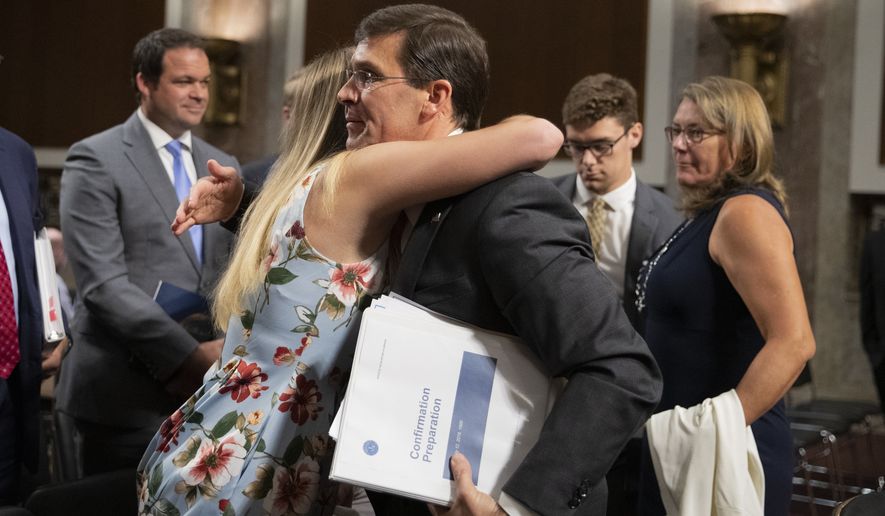The Pentagon has a new chief. Former Army Secretary Mark T. Esper was sworn in as the new defense secretary Tuesday evening in an Oval Office ceremony, ending a long string of uncertainty about the top job at the Pentagon.
Mr. Esper is taking over a Pentagon that has nearly 20 vacant top positions, is navigating a spike in military tensions with Iran, and saw the recent sale of a Russian missile defense system to Turkey that U.S. officials warn could compromise the American-made, state-of-the-art F-35 fighter jet.
The expedited Senate confirmation comes just one week after his nomination hearing before the Senate Armed Services Committee in which Mr. Esper fielded questions on Iran, emerging threats from China and Russia, and his record as a top executive for defense contractor Raytheon.
He told the panel the U.S. is not seeking war with Iran and said the Pentagon was still looking to diplomacy to deal with rising tensions between Tehran and U.S. allies.
“Esper and the president will typically be in agreement that force is the last resort rather than the force you lead with in foreign affairs,” said Loren Thompson, chief operating officer at the Lexington Institute, a think tank focused on national security.
Mr. Esper is headed into the role more than two years into the presidency of Donald Trump, who has practiced an unconventional approach to global relations and rattled several allies by forming relations with traditional adversaries like Russia and North Korea.
Mr. Thompson said the new defense secretary is “going to calm down the allies by putting a more traditional and modulated voice between the president and the leaders of other countries.”
Tuesday’s seal of approval by a 90-8 margin marks the end of a nearly eight-month period the Pentagon spent without a permanent leader after former Defense Secretary James N. Mattis abruptly resigned in December. The record delay in confirming a permanent defense secretary has sparked impatience among lawmakers who are eager to confirm a nominee at the Pentagon after seven months of “acting” leaders since Mr. Mattis’ abrupt departure.
Sen. Elizabeth Warren, Massachusetts Democrat and a 2020 presidential contender, was one of eight senators who voted against Mr. Esper’s confirmation. She pressed him last week on potential conflicts of interest from his time in the defense industry.
Citing Pentagon legal advice, Mr. Esper refused to recuse himself from all discussions that involve Raytheon, a stance Ms. Warren called “outrageous.”
“If you cannot make those commitments to this committee, that means you should not be confirmed as secretary of defense,” she said.
Four other presidential hopefuls were among the small band of Democrats who opposed Mr. Esper: Sens. Kamala D. Harris of California, Amy Klobuchar of Minnesota, Cory A. Booker of New Jersey and Kristen Gillibrand of New York.
But the 55-year-old Mr. Esper, who served in the Army and National Guard for more than 20 years, received widespread bipartisan support both in the committee and on the Senate floor.
Rhode Island Sen. Jack Reed, the Armed Services Committee’s ranking Democrat, told The Washington Times that Mr. Esper’s confirmation is the “beginning of continuity and also stability.”
Sen. Tim Kaine, Virginia Democrat, told the Times he thinks “the vast majority of senators have high confidence in Esper.”
“He’s somebody who’s done a good job of giving a straight answers to questions.”
Mr. Esper saw combat with the Army in the 1991 Gulf War. He has also worked as a staffer on Capitol Hill, including a stint as policy director for the House Armed Services Committee.
Mr. Thompson said he believes Mr. Esper “will be more successful in dealing with Congress than any defense secretary in modern times … In part because his personality is perfectly fitted to the institution.”
In 2017, Mr. Trump nominated Mr. Esper to become secretary of the Army, a job he held until last month. In June, Mr. Esper became acting defense secretary after Mr. Trump’s first choice, Patrick M. Shanahan, withdrew citing family reasons.
Assistant to the Secretary of Defense Jonathan Hoffman told reporters Tuesday morning that once Mr. Esper is confirmed, “the department’s prepared to rapidly transition him into office.”
Mr. Hoffman explained that Mr. Esper’s first act as defense secretary will be to “delegate all duties of the deputy secretary of defense to Secretary of the Navy Richard V. Spencer,” while the current acting deputy defense secretary David Norquist goes through his confirmation process and prepares for his nomination hearing with the committee Wednesday morning.
• Lauren Toms can be reached at lmeier@washingtontimes.com.




Please read our comment policy before commenting.